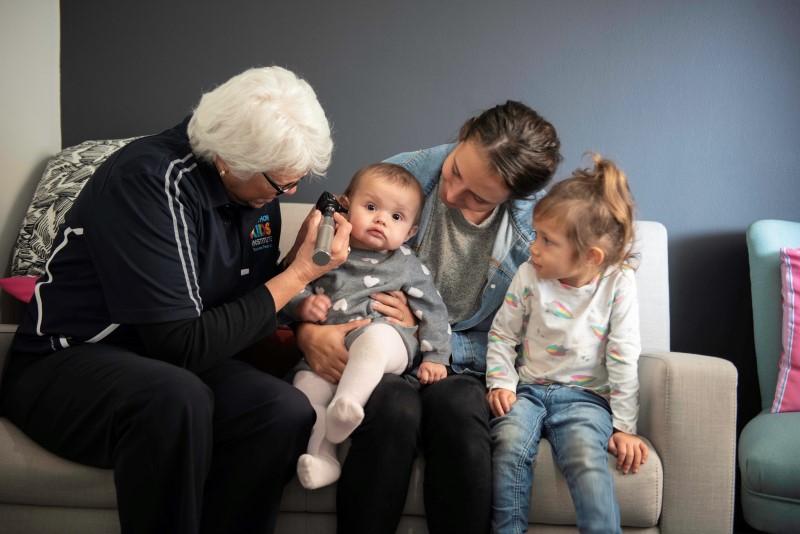Search
Research
Non-communicable disease mortality in young people with a history of contact with the youth justice system in Queensland, Australia: a retrospective, population-based cohort studyYoung people who have had contact with the criminal justice system are at increased risk of early death, especially from injuries. However, deaths due to non-communicable diseases (NCDs) in this population remain poorly described. We aimed to estimate mortality due to NCDs in people with a history of involvement with the youth justice system, compare NCD mortality rates in this population with those in the general population, and characterise demographic and justice-related factors associated with deaths caused by NCDs in people with a history of contact with the youth justice system.
Research
Early onset of otitis media is a strong predictor of subsequent disease in urban Aboriginal infants: Djaalinj Waakinj cohort studyAustralian Aboriginal and/or Torres Strait Islander children in rural/remote areas suffer high rates of persistent otitis media (OM) from early infancy. We aimed to determine the proportion of Aboriginal infants living in an urban area who have OM and investigate associated risk factors.
Research
Exploring the Reported Strengths and Limitations of Aboriginal and Torres Strait Islander Health Research: A Narrative Review of Intervention StudiesHigh quality intervention research is needed to inform evidence-based practice and policy for Aboriginal and Torres Strait Islander communities. We searched for studies published from 2008-2020 in the PubMed database. A narrative review of intervention literature was conducted, where we identified researcher reported strengths and limitations of their research practice.
Research
Murru Minya-informing the development of practical recommendations to support ethical conduct in Aboriginal and Torres Strait Islander health research: a protocol for a national mixed-methods studyConducting ethical and high-quality health research is crucial for informing public health policy and service delivery to reduce the high and inequitable burden of disease experienced by Aboriginal and Torres Strait Islander people.
Research
Understanding the implementation of health checks in the prevention and early detection of chronic diseases among Aboriginal and Torres Strait Islander people in Australia: a realist review protocolChronic disease remains the leading cause of morbidity and mortality among Aboriginal and Torres Strait Islander peoples in Australia. Regular structured, comprehensive health assessments are available to Aboriginal and Torres Strait Islander people as annual health checks funded through the Medicare Benefits Schedule.
Research
Histo-blood group antigen profile of Australian Aboriginal children and seropositivity following oral rotavirus vaccinationHisto-blood group antigens (HBGAs) may influence immune responses to rotavirus vaccination.
Research
Folate status in Aboriginal people before and after mandatory fortification of flour for bread-making in AustraliaThe mandatory fortification of wheat flour for bread-making has increased folate status and reduced Neural Tube Defects in the Australian Aboriginal population

News & Events
New Aboriginal Cultural Guidance Advisor appointedThe Wesfarmers Centre of Vaccines and Infectious Diseases has appointed Mrs Valerie Swift to a newly created Aboriginal Cultural Guidance Advisor position.
Research
“Our kids are our future”: Barriers and facilitators to vaccine uptake and timeliness among Aboriginal children younger than five years in Boorloo (Perth), Western AustraliaRates of several vaccine preventable diseases, and associated hospitalisation, are higher among Aboriginal and/or Torres Strait Islander children than non-Indigenous children. Western Australia has among the lowest childhood vaccine coverage in Australia, particularly among Aboriginal and/or Torres Strait Islander children. Delayed vaccination is also more common in this population. This project aimed to understand the barriers and facilitators to vaccine uptake and timeliness among Aboriginal and/or Torres Strait Islander children aged under five years in Boorloo (Perth).
Research
The impact of genetics and the environment on cancer risk in Indigenous Australians: a narrative reviewAboriginal and Torres Strait Islander (hereafter respectfully named Indigenous) Australians are diagnosed with some cancers substantially more frequently than non-Indigenous Australians implying a different risk factor landscape. Additionally, poorer outcomes for certain cancers are exacerbated by lower cancer screening rates and later diagnoses compared to non-Indigenous Australians.
